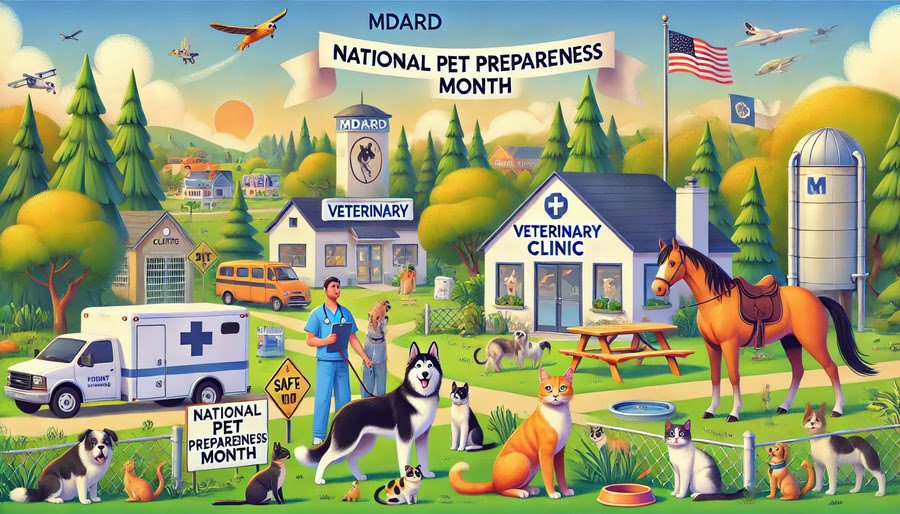Tuesday, June 25, 2024
Reading Time: 2 Minutes

This June, the Michigan Department of Agriculture and Rural Development (MDARD) will observe National Pet Disaster Preparedness Month, focusing on the health and safety of animals during natural and man-made disasters, as well as their everyday well-being.
“Preparing for your animals should start by considering their overall health. Working with your veterinarian can help ensure you are doing all you can to keep your animals healthy.” “We are pleased to be able to provide this service to our patients,” said State Veterinarian Dr. Nora Wineland, DVM, MS, DACVPM. “Continuing with basic vaccinations, taking simple precautions to avoid disease and making sure they have up-to-date identification will help keep your animals healthy and safe in any situation.”
Vaccinations are essential to prevent many diseases, including zoonotic diseases that affect both animals and humans. Core vaccinations, such as rabies, are essential for dogs, cats, ferrets, horses, and other animals. Rabies, a zoonotic and often fatal disease, is transmitted by wild animals such as bats and skunks in Michigan. Pets can contract rabies through bites or contact with rabies-infected animals. As of June 13, 2024, there have been 15 reported cases of bat rabies in Michigan. A safe and effective vaccine is available to protect animals from this virus.
Vaccination is equally important for horses, protecting them from mosquito-borne diseases such as West Nile Virus (WNV), Eastern Equine Encephalitis (EEE), and Western Equine Encephalitis. WNV and EEE are common in Michigan, with EEE being particularly deadly. There have been four confirmed cases of WNV and one case of EEE in horses in 2023, many of which were unvaccinated or undervaccinated, leading to severe illness and euthanasia.
Other diseases can also affect your animal’s health. Consulting with your veterinarian can help you determine which vaccines are best for your animal and ensure they are up to date.
In addition to vaccinations, your veterinarian can also advise you on other preventative measures. Simple actions like washing your hands before handling animals, keeping your shoes out of reach of animals, avoiding contact with wild animals, avoiding contact with sick or strange animals, and not sharing bowls or toys can help keep your animals healthy. Your veterinarian can suggest new strategies to keep your animals healthy.
Keeping your pet’s identification up to date is also an important step in keeping your pet safe. If your pet goes off leash, sneaks away, jumps a fence or gets lost in a chaotic situation, an up-to-date ID tag and registered microchip will help you get your pet back quickly. Your veterinarian can help you with proper identification and acquisition.
Focusing on the health and safety of your animals today will ensure you are better prepared for any situation tomorrow.


